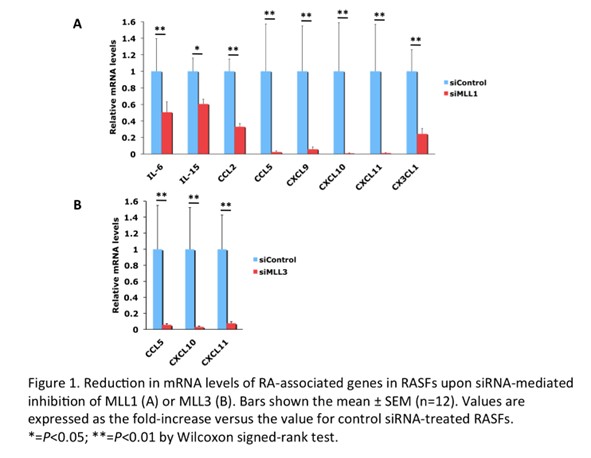Session Information
Date: Sunday, October 26, 2025
Title: (0067–0097) Rheumatoid Arthritis – Etiology and Pathogenesis Poster
Session Type: Poster Session A
Session Time: 10:30AM-12:30PM
Background/Purpose: Rheumatoid arthritis synovial fibroblasts (RASFs) produce various matrix metalloproteinases (MMPs), cytokines, and chemokines. Histone lysine methylation has been shown to play an important role in the activation of RASFs. We reported that histone lysine methyltransferases (HKMTs), including myeloid/lymphoid or mixed-lineage leukemia 1 (MLL1) and MLL3, are aberrantly expressed in RASFs (PMID: 29465369). MLL1 and MLL3 catalyze histone H3 lysine 4 (H3K4) methylation and are each part of complex proteins associated with Set1 (COMPASS)-like complexes that include WD repeat domain 5 (WDR5) (PMID: 22663077). WDR5 is essential for methylation of H3K4 by MLL1 and MLL3. We investigated the role of MLL1 and MLL3 in RASFs in terms of epigenetic mechanisms of RA pathogenesis.
Methods: Human SFs were isolated from synovial tissues obtained from RA or osteoarthritis (OA) patients undergoing total knee arthroplasty. MLL1 and MLL3 mRNA levels of the above SFs were determined after tumor necrosis factor alpha (TNFα) stimulation. Trimethylation of H3K4 (H3K4me3) is present at the promoters of actively transcribed genes. We investigated changes in mRNA levels of RA-associated genes (matrix-degrading enzymes, cytokines, and chemokines) and H3K4me3 levels in the promoters of these genes upon small interfering RNA-mediated depletion of MLL1 and MLL3 in RASFs. We then determined the levels of H3K4me3 and mRNAs after treatment with MM-102, a WDR5 inhibitor. H3K4me3 levels in the gene promoters were also compared between RASFs and OASFs. Differences between unpaired or paired groups were evaluated using the Mann–Whitney U test or the Wilcoxon signed-rank test, respectively.
Results: MLL1 and MLL3 mRNA levels were significantly higher in RASFs than in OASFs after TNFα stimulation. MLL1 depletion significantly decreased the mRNA levels of several genes of cytokines (IL-6 and IL-15) and chemokines (CCL2, CCL5, CXCL9, CXCL10, CXCL11, and CX3CL1) in RASFs (Figure 1A). Correspondingly, MLL1 depletion significantly reduced H3K4me3 levels in the promoters of the cytokine and chemokine genes in RASFs (Figure 2). These results indicate that MLL1 activates the cytokine and chemokine genes by increasing promoter H3K4me3 levels in RASFs. Interestingly, MLL3 depletion also suppressed the mRNA levels of CCL5, CXCL10, and CXCL11 genes in RASFs (Figure 1B). However, H3K4me3 levels in the promoters of the chemokine genes were not altered by MLL3 depletion in RASFs (Figure 2). Since it has been reported that MLL3 is involved in the generation of H3K4 monomethylation (H3K4me1) in the enhancers of actively transcribed genes (PMID: 24081332), our results suggest that MLL3 may activate CCL5, CXCL10, and CXCL11 genes by increasing enhancer H3K4me1 levels. MM-102 significantly decreased promoter H3K4me3 and mRNA levels of CCL5, CXCL9, CXCL10, and CXCL11 genes in RASFs. H3K4me3 levels in the promoters of IL-6, IL-15, CCL2, CCL5, CXCL9, CXCL10, CXCL11, and CX3CL1 genes were significantly higher in RASFs than in OASFs.
Conclusion: This study elucidated the epigenetic mechanism by which MLL1 and MLL3 cooperate to activate chemokine genes in RASFs. These findings may lead to new treatments such as targeting histone methyltransferases for RA.
To cite this abstract in AMA style:
Okamoto K, Araki Y, Aizaki Y, Kajiyama H, Yokota K, Funakubo Y, Kadono Y, Akiyama Y, Mimura T. Regulation of the same chemokine gene transcription by different histone lysine methyltransferases, MLL1 and MLL3, in rheumatoid arthritis synovial fibroblasts [abstract]. Arthritis Rheumatol. 2025; 77 (suppl 9). https://acrabstracts.org/abstract/regulation-of-the-same-chemokine-gene-transcription-by-different-histone-lysine-methyltransferases-mll1-and-mll3-in-rheumatoid-arthritis-synovial-fibroblasts/. Accessed .« Back to ACR Convergence 2025
ACR Meeting Abstracts - https://acrabstracts.org/abstract/regulation-of-the-same-chemokine-gene-transcription-by-different-histone-lysine-methyltransferases-mll1-and-mll3-in-rheumatoid-arthritis-synovial-fibroblasts/


.jpg)